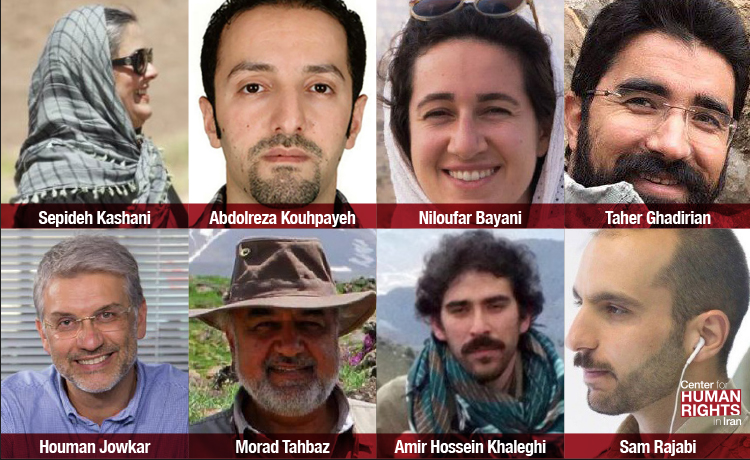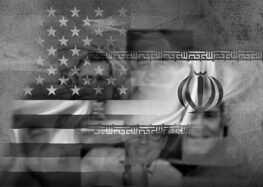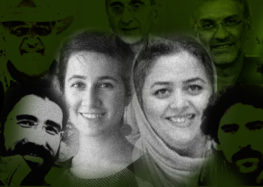Death Penalty-Carrying Charge Dropped Against Four Conservationists After Supreme Leader Intervened

The charge of “corruption on earth,” which can lead to the death penalty under Iranian law, has been dropped against four detained conservationists following intervention by Iran’s Supreme Leader Ali Khamenei, the Center for Human Rights in Iran (CHRI) has learned.
“After great efforts by the attorneys and families of the imprisoned conservationists, the supreme leader has ordered the authorities to pay attention to the expert opinion of the Intelligence Ministry regarding this case, and for this reason their trial was put on hold,” a source with detailed knowledge of the cases told CHRI on condition of anonymity on October 13, 2019.
In a direct rebuttal of claims by the intelligence organization of the Islamic Revolutionary Guard Corps (IRGC), an elite branch of the Iranian military that reports only to the supreme leader, the Intelligence Ministry, which operates under President Hassan Rouhani, stated in early 2019 that the conservationists did not engage in espionage.
“Also the prosecutor [assigned to this case] has been changed and… this charge [‘corruption on earth’] has been dropped,” the source added.
“Corruption on earth” was one of several charges Morad Tahbaz, Niloufar Bayani, Taher Ghadirian and Houman Jowkar—four of the nine conservationists detained in Iran by the IRGC’s intelligence organization in January 2018—were facing after being accused by the IRGC of engaging in espionage.
However, the four, along with fellow detained conservationists Sepideh Kashani, Amir Hossein Khaleghi, Sam Rajabi and Abdolreza Kouhpayeh, still face other serious charges, according to attorney Mohammad Hossein Aghasi, who represented Sam Rajabi.
“They are all facing the charge of ‘assembly and collusion against national security,’” Aghasi told CHRI on October 13. “There is also the charge of ‘contacts with U.S. enemy government … for the purpose of spying,’ but the judge is leaning towards acquittal in regard to spying.”
At a press conference on October 14, Judiciary Spokesman Gholam-Hossein Esmaili confirmed that the charge against three of the detainees had been dropped.
“Based on Article 280 of the Criminal Procedures Regulations, which allows the court to change the charges, the charge of ‘corruption on earth’ has been changed to ‘cooperation with the U.S. enemy government and the Zionist regime [Israel] against the Islamic Republic of Iran for the purpose of spying for the CIA and Mossad,” Esmaili said.
In an opinion piece published by the reformist Etemad newspaper on October 14, Mohammad Reza Tabesh, the head of the Environmental Faction in Iran’s Parliament wrote:
“Some of the responsible agencies, namely the special four-member fact-finding committee set up on the president’s orders, as well as some officials and environmental experts, have written several reports about the work carried out by the dear conservationists and emphasized the need to drop these charges. In other words, these reports all absolve the dear conservationists of spying accusations.”
He added: “At the same time, following these reports, there has been an important development. The Supreme Leader’s Office has referred the case to the Supreme National Security Council and subsequently we had a meeting with the council’s secretary. The meeting reignited the flame of hope in our hearts… that this case will eventually end happily.”
Mounting Evidence Clears Conservationists of Spying Charges
The detainees’ families have written several open letters to Khamenei and the heads of the three branches of state insisting on the conservationists’ innocence and pleading for their freedom.
In May 2018, four months after the conservationists—all current and former staff members of the Tehran-based Persian Heritage Wildlife Foundation (PHWF)—were arrested, the head of Iran’s Department of Environment (DOE), Vice President Isa Kalantari, revealed that the Intelligence Ministry had determined that the detainees had not engaged in espionage—a direct contradiction of the IRGC’s allegations.
“It has been determined that these individuals were detained without doing anything,” Kalantari said on May 22, 2018. “The Intelligence Ministry has concluded that there is no evidence that these individuals were spies.”
“The government’s fact-finding committee has concluded that the detained activists should be released because there’s no evidence to prove the accusations leveled against these individuals,” he added.
A report on the issue by the Intelligence Ministry was never made public, but on May 8, 2018, Member of Parliament Mahmoud Sadeghi tweeted that the Intelligence Ministry’s counter-intelligence experts “had found no evidence at all of their [the environmentalist’ alleged] ties to espionage.”
In addition to the Intelligence Ministry, the country’s highest national security-focused body, the Supreme National Security Council, also refuted the IRGC’s allegation that the conservationists were spying.
Judiciary Relied on Forced “Confessions”
According to Aghasi, Tahbaz appeared in court on October 12, 2019, and the other co-defendants will be tried soon.
“Mr. Tahbaz’s trial was held on Saturday and they heard his final defense,” Aghasi told CHRI. “The other activists will also go on trial in the next two weeks.”
Tahbaz, along with Bayani, initially went on trial on January 30, 2019, at Branch 15 of the Revolutionary Court in Tehran, presided by the notoriously hardline Judge Abolqasem Salavati. But after two sessions, the trial did not resume.
A source with detailed knowledge of the cases told CHRI in January 2019 that some of the conservationists “were subjected to months of solitary confinement and psychological torture, threatened with death, threatened with being injected with hallucinogenic drugs, threatened with arrest and the death of family members.”
“Some of the detainees were also physically beaten up… all to force them to give false confessions against themselves,” added the source who requested anonymity for fear of reprisals by Iranian security forces.
The PHWF’s managing director, Iranian Canadian sociologist Kavous Seyed-Emami, died under suspicious circumstances in Iran’s Evin Prison in February 2018, less than two weeks after being arrested by the IRGC.
Prison authorities claimed Seyed-Emami had committed suicide, but the judiciary refused to allow the family to conduct an independent autopsy and security agents pressured the family to quickly bury him.
His wife was banned from leaving Iran for almost a full year after his death. To date, many questions persist about the circumstances of Seyed-Emami’s death, and no one has been held accountable for the death of the detainee in state custody.
Report: IRGC Targeted Conservationists for Their Protest Against Missile Sites on Protected Land
The IRGC has accused the conservationists of gathering intelligence on Iran’s missile installations for the U.S. and Israel under the guise of protecting endangered species, including the Asiatic Cheetah, which the group was tracking with camera traps.
But according to the opposition-run news site Kalame, the IRGC had targeted the conservationists for opposing missile sites on protected lands.
“Kalame has received information that the environmental activists are not spies but in fact had resisted the IRGC’s excessive demands to encroach on environmentally protected regions for the installation of missile sites,” Kalame reported on April 16, 2018.
The report continued: “Although these regions were registered by the United Nations as protected areas, the IRGC thought it could build military sites there without any problem, thus it went ahead with installing missile silos and equipment. The move met opposition from environmental groups that repeatedly asked the IRGC to evacuate. The groups made it clear that the IRGC was endangering their activities of collecting information and taking photos of animals and plants for the UN. But the IRGC did not agree and asked these groups to instead submit old photos in their annual reports to the UN.”
“The conflict between the two sides went on for years and eventually the IRGC’s intelligence organization used espionage as an excuse to arrest the environmentalists so that it could continue its activities in the protected regions without any problem,” the report added.
On November 8, Gholamhossein Esmaili, the chief prosecutor of Tehran Province, pointed to the “camera traps” the conservationists were using as evidence that they were spying.
In fact, the cameras—standard professional equipment commonly used in the field—are an “essential tool in providing a critical basis for both science and conservation strategies to save species from extinction,” said dozens of conservation practitioners and scholars including renowned primatologist Jane Goodall in a November 2018 open letter calling for their release.
As in the case of Seyed-Emami who died in state custody, Iranian state-run TV has repeatedly run sensationalist news reports and comments by hardline judicial officials all aimed at smearing the detainees, who have been denied the right to respond or defend themselves before the Iranian public.
The UN has called the charges against the conservationists “hard to fathom” and called for Iran to guarantee fair trials.
“Nowhere in the world, including Iran, should conservation be equated to spying or regarded as a crime,” said UN human rights experts in February 2018. “Detention of human rights defenders for their work is arbitrary in nature.”
Read this article in Persian.





